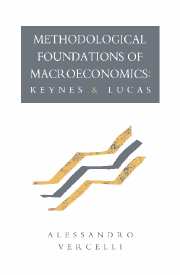Book contents
- Frontmatter
- Contents
- Preface
- List of abbreviations
- 1 Introduction
- Part 1 Methodological foundations of macroeconomics
- Part II Keynes after Lucas
- 8 Lucas's scientific paradigm
- 9 Lucas's heuristic model
- 10 The real equilibrium business cycle and Lucas's attempt at a synthesis
- 11 Keynes's heuristic model: general observations
- 12 Money and production in Schumpeter and Keynes: two dichotomies
- 13 Keynes's heuristic model: methodological aspects
- 14 Conclusions
- References
- Subject index
- Author index
8 - Lucas's scientific paradigm
Published online by Cambridge University Press: 05 January 2012
- Frontmatter
- Contents
- Preface
- List of abbreviations
- 1 Introduction
- Part 1 Methodological foundations of macroeconomics
- Part II Keynes after Lucas
- 8 Lucas's scientific paradigm
- 9 Lucas's heuristic model
- 10 The real equilibrium business cycle and Lucas's attempt at a synthesis
- 11 Keynes's heuristic model: general observations
- 12 Money and production in Schumpeter and Keynes: two dichotomies
- 13 Keynes's heuristic model: methodological aspects
- 14 Conclusions
- References
- Subject index
- Author index
Summary
It almost looks as if [they] were trying to compensate themselves for the loss of an unchanging world by clinging to the faith that change can be foreseen because it is ruled by an unchanging law.
(Popper, 1957, p. 161)Introduction
In this chapter I will briefly describe the outlines of Lucas's research programme (or ‘paradigm’) as it was worked out and expressed in the seventies. Needless to say, this research programme had a tremendous impact on macroeconomics, particularly in the English-speaking world. The version of the seventies is now historically dated and has been superseded in many crucial points by Lucas himself and other new classical economists. This is not at all surprising as any lively research programme undergoes an evolution due to internal and external impulses. Therefore the criticisms I shall raise in this chapter should not be mechanically transferred to other new classical economists, or to Lucas's contributions published before or afterwards. In the sixties Lucas was still attempting to contribute to Keynesian literature (see Lucas, 1981, p. 2), while in the eighties he has tried, together with other new classical economists, to go beyond the limitations of his previous work.
Lucas's research programme of the seventies is very important not only for historical reasons, but also because it was the source of his heuristic model (discussed in chapter 9), which is still at the centre of the research carried on by Lucas and the other new classical economists. So, for example, the real-business-cycle literature dramatically departs from the monetarism of Lucas's research programme in the seventies, but explicitly accepts the basic tenets of Lucas's heuristic model (see chapter 10).
- Type
- Chapter
- Information
- Methodological Foundations of MacroeconomicsKeynes and Lucas, pp. 127 - 142Publisher: Cambridge University PressPrint publication year: 1991



